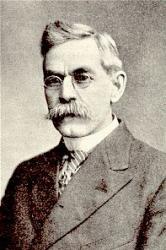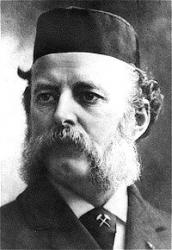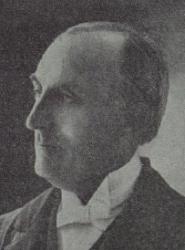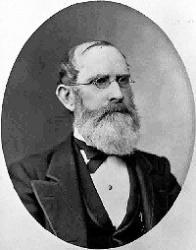Planning worship?
Check out our sister site, ZeteoSearch.org,
for 20+ additional resources related to your search.
- |
User Links
Person Results
‹ Return to hymnal





Export as CSV
J. Sebastian B. Hodges
1830 - 1915 Person Name: J. S. B. Hodges Hymnal Number: 178 Author of "Ring Out the Bells" in Songs of the Golden Born: 1830, Bristol, Gloucestershire, England.
Died: May 1, 1915, Baltimore, Maryland.
Buried: Allegheny Cemetery, Pittsburgh, Pennsylvania.
Son of composer Edward Hodges, John emigrated to America in 1845, and attended Columbia University and the General Theological Seminary in New York City. Ordained an Episcopal minister in 1854, he served at the Grace/Second Episcopal Church, Newark, New Jersey (1860-70), and was Rector of St. Paul’s, Baltimore, Maryland, for 35 years. His works include:
The Book of Common Praise, 1869
The revised edition of Hymn Tunes, 1903
--www.hymntime.com/tch
J. Sebastian B. Hodges
Fred A. Fillmore

1856 - 1925 Hymnal Number: 32 Composer of "[Oh, to be something, something]" in Songs of the Golden Born: May 15, 1856, Paris, Illinois.
Died: November 15, 1925, Terrace Park, Ohio.
Buried: Milford, Ohio.
Frederick Augustus Fillmore, who was born on May 15, 1856, in Paris, IL, one of seven children, five sons and two daughters, born to Augustus Damon and Hannah Lockwood Fillmore. His father was a preacher in the Christian Church, as well as a composer,
songbook compiler, and hymn publisher who developed his own system of musical notation using numbers on the staff in place of note heads. Augustus eventually settled in Cincinnati, OH, and established a music publishing business there. Until 1906, there was no official distinction between "Christian Churches" and "Churches of Christ." The names were used pretty much interchangeably, and many older churches of Christ which are faithful today were once known as "Christian Churches."
Fred and his older brother James took over their father's publishing business following the death of Augustus in 1870 and established the Fillmore Brothers Music House. This became a successful Cincinnati music form, publishing church hymnals and later band and orchestral music. For many years the firm issued a monthly periodical, The Music Messenger. The brothers edited many hymnbooks and produced many songs which became popular. Beginning with the songbook Songs of Glory in 1874, there appeared many Fillmore publications which became widely used through churches, especially in the midwest. For these collections, Fred provided a great deal of hymn tunes.
--launch.groups.yahoo.com/group/hymnoftheday
Fred A. Fillmore
Charles Zeuner
1795 - 1857 Person Name: Chas. Zeuner Hymnal Number: 171 Composer of "[Christ, the Lord is ris'n today]" in Songs of the Golden Also:
Zeuner, Heinrich Christoph, 1795-1857
Zeuner, Heinrich Christopher, 1795-1857
Charles Zeuner
Rossiter W. Raymond

1840 - 1918 Hymnal Number: 23 Author of "Far Out on the Lonely Billow" in Songs of the Golden Raymond, Rossiter Worthington, PH.D., was b. in Cincinnati, Ohio, April 27,1840. He graduated at Brooklyn Polytechnic, 1858, and also studied in Germany. He served in the Civil War of 1861-4 with the grade of Captain. Since then he has practised in New York as a consulting mining engineer. He was editor of the American Journal of Mining, and is a contributor to scientific literature. He has also written stories for children, a Paraphrase of Job, and some fugitive poetry. His hymns in common use include:—
1. Far out on the desolate billow. [God everywhere.] Written for the German tune, "Ich weiss nicht was soil es bedeuten," and published in The Plymouth Hymnal, 1894.
2. Morning red, Morning red. [Easter.] Written to the tune" Morgenroth," a German battle-song, and published in the American Book of Praise.
3. Now rest, ye pilgrim host. [Reviewing the Past.] This hymn is dated 1879, and was written for the 50th anniversary oi the Brooklyn Sunday School Union. It was included in The Plymouth Hymnal, 1891, No. 509, and, after revision by the author, in Sursum Corda, 1898, and other collections.
4. 0 Thou Who art inspiring. [Submission.] Appeared in The Plymouth Hymnal, 1894, No. 635, and later in other collections.
5. The God Who spann'd the heavens above. [Courage in Conflict.] "Written for my Sunday School, to be sung to the tune of the German patriotic song, ‘Der Gott, der Eisen wachsen liess' (by Arndt, p, 79, ii.), of which my first line is an evident and intentional imitation, though the remainder is not" (Author's MS.). It was published in The Book of Praise, the Sursum Corda, 1898, and others. It is sometimes attributed to "J. Clark,” but in error.
6. There dwelt in old Judaea. In Allon's Children's Worship, 1878.
Of the above Nos. 1, 2, 5 are in W. B. Bradbury's Clarion, 1867. Dr. Raymond is a Congregationalist, and is associated with the Plymouth Church, Brooklyn. [Rev. L. F. Benson, D.D.]
--John Julian, Dictionary of Hymnology, New Supplement (1907)
Rossiter W. Raymond
Charles Edward Pollock
1853 - 1928 Person Name: Chas. Edw. Pollock Hymnal Number: 161 Composer of "[The book of the New Year is open'd]" in Songs of the Golden Charles Edward Pollock USA 1853-1928. Born at Newcastle, PA, he moved to Jefferson City, MO, when age 17. He was a cane maker for C W Allen. He also worked 20 years for the MO Pacific Railroad, as a depot clerk and later as Assistant Roadmaster. He was a musician and prolific songwriter, composing 5000+ songs, mostly used in Sunday school settings and church settings. He took little remuneration for his compositions, preferring they be freely used. He produced three songbooks: “Praises”, “Beauty of praise”, and “Waves of melody”. In 1886 he married Martha (Mattie) Jane Harris, and they had three children: Robert, Edward, and a daughter. He died in Merriam, KS.
John Perry
=================
Pollock, Charles Edward. (Jefferson City, Missouri, 1853-1924). Records of Jefferson City indicate the following:
1897 clerk at depot; residence at 106 Broadway (with Mildred Pollock)
1904-1905 cane maker for C. W. Allen
1908-1909 musician; residence at 106 Broadway (with wife Matty)
1912-1913 residence at St. Louis Road, east city limits
--Wilmer Swope, DNAH Archives
Note: not to be confused with Charles Edward Pollock (c.1871-1924).
Charles Edward Pollock
C. Meineke
1782 - 1850 Person Name: Chas. Meineke Hymnal Number: 89 Composer of "[Glory be to the Father, and to the Son, and to the Holy Ghost]" in Songs of the Golden Meineke (1782-1850) is referred to by several given names including C., Charles, Christopher, Christoph, and Karl. Meineke apparently left Germany in 1810 and, after spending some time in England, moved to the United States, settling in Baltimore, Maryland, by 1822. He was organist at St. Paul’s Episcopal Church in Baltimore in 1836, likely serving in this position for some eight years.
Meineke published several works including "Music for the Church: Containing Sixty-two Psalm and Hymn Tunes in Four Parts: Together with Chants, Doxologies and Responses for Morning and Evening Prayer, and Holy Communion: Composed for the Use of the Choir of St. Paul's Church, Baltimore" (Baltimore, 1844). He composed the music for Glory Be to the Father and to the Son (MEINEKE).
Source: Danny R. Jones, "Christoph Meineke," Worship Matrix, http://www.worshipmatrix.com/Composerr.php?code=335
C. Meineke
Darius E. Jones
1815 - 1881 Person Name: D. E. Jones Hymnal Number: 151 Composer of "[Silently the shades of ev'ning]" in Songs of the Golden
Darius E. Jones
George C. Hugg

1848 - 1907 Person Name: Geo. C. Hugg Hymnal Number: 70 Composer of "[Walk in the light the Lord hath giv'n]" in Songs of the Golden George Crawford Hugg USA 1848-1907. Born near Haddonfield, NJ, he became choirmaster at the Berlin, NJ, Presbyterian Church at age 12. At age 14 he published his first song, “Walk in the light”, which became very popular. He married Anne E Ketchum, and they had a daughter, Evangeline. He served as choirmaster of the Tabernacle Presbyterian Church in Philadelphia, and also the Broad Street and Arch Street Methodist Episcopal Churches there. He was also closely associated with the Harper Memorial Presbyterian Church there. He was a prolific composer with over 2000 works, publishing 18 books of revival and Sunday school music, and 90 songs for special occasions (Christmas, Easter, etc.). He died in Philadelphia, PA.
John Perry
George C. Hugg
J. H. Rosecrans

1845 - 1926 Hymnal Number: 158 Composer of "[Church of God, whose conqu'ring legions]" in Songs of the Golden James Holmes Rosecrans studied at the Baxter University of Music in Friendship, New York. After teaching for two years, he joined the Fillmore Brothers Music House in Cincinnati, Ohio. As of 1880, he was teaching music in Douglas County, Colorado. In 1884, was an evangelist in California, and later was associated with evangelistic efforts in Texas, and taught music and Bible at Carlton College in Bonham, Texas. He published over 20 music collections in his lifetime.
© The Cyber Hymnal™ (www.hymntime.com/tch)
J. H. Rosecrans
C. C. Cox

1816 - 1882 Hymnal Number: 151 Author of "The Shades of Evening" in Songs of the Golden Cox, Christopher Christian, M.D., was a Maryland physician, and long prominent in the public service. Born at Baltimore, Aug. 28, 1816, and graduated at Yale College, 1835. He practised medicine in Baltimore, 1838, and in Talbot County, Maryland, 1843. In 1861 he became Brigade Surgeon U. S. A., and resided in Washington. He died Nov. 25, 1882. He was a member of the Protestant Episcopal Church. His hymns in common use are:—
1. Silently the shades of evening. Evening. Written in 1840 or 1846, and published in Woodworth's Cabinet, 1847, with music. It is much used in American hymn-books.
2. The burden of my sins, 0 Lord. Lent. Appeared in the Cantate Domino, Boston, 1859, together with two additional originals and two translations. These hymns are unknown to English collections. [Rev. F. M. Bird, M.A.]
--John Julian, Dictionary of Hymnology (1907)
C. C. Cox


 My Starred Hymns
My Starred Hymns


